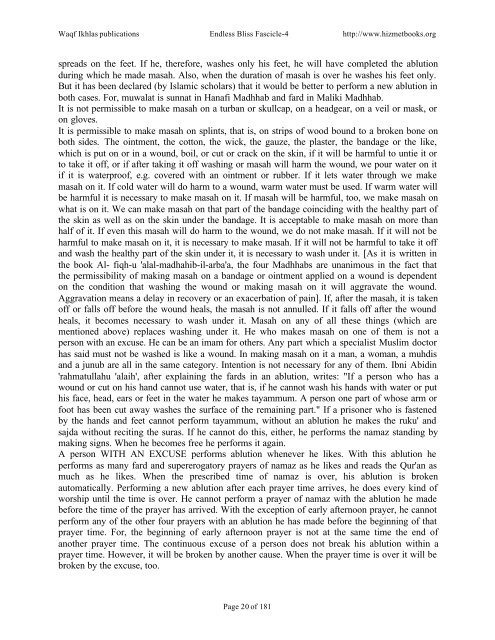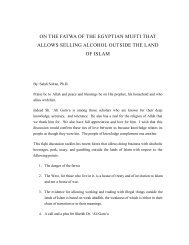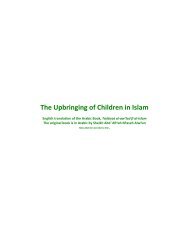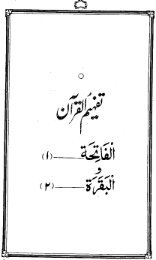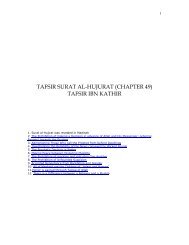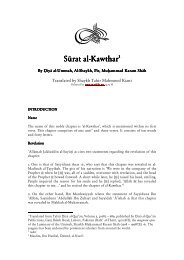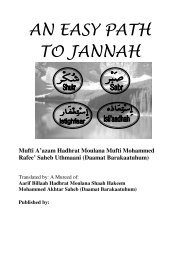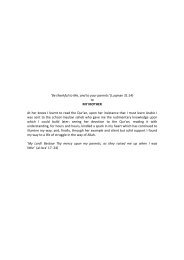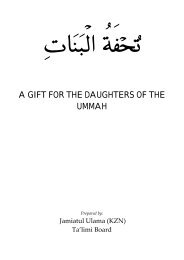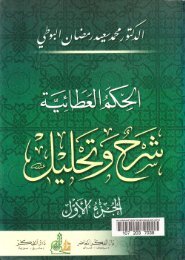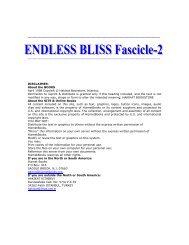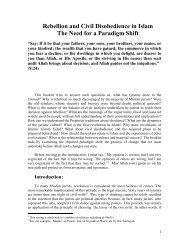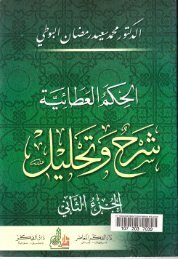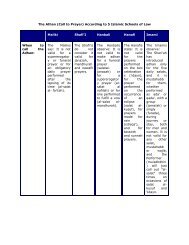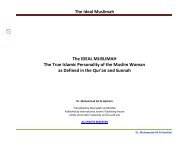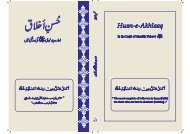ENDLESS BLISS FASCICLE-4
ENDLESS BLISS FASCICLE-4
ENDLESS BLISS FASCICLE-4
You also want an ePaper? Increase the reach of your titles
YUMPU automatically turns print PDFs into web optimized ePapers that Google loves.
Waqf Ikhlas publications Endless Bliss Fascicle-4 http://www.hizmetbooks.org<br />
spreads on the feet. If he, therefore, washes only his feet, he will have completed the ablution<br />
during which he made masah. Also, when the duration of masah is over he washes his feet only.<br />
But it has been declared (by Islamic scholars) that it would be better to perform a new ablution in<br />
both cases. For, muwalat is sunnat in Hanafi Madhhab and fard in Maliki Madhhab.<br />
It is not permissible to make masah on a turban or skullcap, on a headgear, on a veil or mask, or<br />
on gloves.<br />
It is permissible to make masah on splints, that is, on strips of wood bound to a broken bone on<br />
both sides. The ointment, the cotton, the wick, the gauze, the plaster, the bandage or the like,<br />
which is put on or in a wound, boil, or cut or crack on the skin, if it will be harmful to untie it or<br />
to take it off, or if after taking it off washing or masah will harm the wound, we pour water on it<br />
if it is waterproof, e.g. covered with an ointment or rubber. If it lets water through we make<br />
masah on it. If cold water will do harm to a wound, warm water must be used. If warm water will<br />
be harmful it is necessary to make masah on it. If masah will be harmful, too, we make masah on<br />
what is on it. We can make masah on that part of the bandage coinciding with the healthy part of<br />
the skin as well as on the skin under the bandage. It is acceptable to make masah on more than<br />
half of it. If even this masah will do harm to the wound, we do not make masah. If it will not be<br />
harmful to make masah on it, it is necessary to make masah. If it will not be harmful to take it off<br />
and wash the healthy part of the skin under it, it is necessary to wash under it. [As it is written in<br />
the book Al- fiqh-u 'alal-madhahib-il-arba'a, the four Madhhabs are unanimous in the fact that<br />
the permissibility of making masah on a bandage or ointment applied on a wound is dependent<br />
on the condition that washing the wound or making masah on it will aggravate the wound.<br />
Aggravation means a delay in recovery or an exacerbation of pain]. If, after the masah, it is taken<br />
off or falls off before the wound heals, the masah is not annulled. If it falls off after the wound<br />
heals, it becomes necessary to wash under it. Masah on any of all these things (which are<br />
mentioned above) replaces washing under it. He who makes masah on one of them is not a<br />
person with an excuse. He can be an imam for others. Any part which a specialist Muslim doctor<br />
has said must not be washed is like a wound. In making masah on it a man, a woman, a muhdis<br />
and a junub are all in the same category. Intention is not necessary for any of them. Ibni Abidin<br />
'rahmatullahu 'alaih', after explaining the fards in an ablution, writes: "If a person who has a<br />
wound or cut on his hand cannot use water, that is, if he cannot wash his hands with water or put<br />
his face, head, ears or feet in the water he makes tayammum. A person one part of whose arm or<br />
foot has been cut away washes the surface of the remaining part." If a prisoner who is fastened<br />
by the hands and feet cannot perform tayammum, without an ablution he makes the ruku' and<br />
sajda without reciting the suras. If he cannot do this, either, he performs the namaz standing by<br />
making signs. When he becomes free he performs it again.<br />
A person WITH AN EXCUSE performs ablution whenever he likes. With this ablution he<br />
performs as many fard and supererogatory prayers of namaz as he likes and reads the Qur'an as<br />
much as he likes. When the prescribed time of namaz is over, his ablution is broken<br />
automatically. Performing a new ablution after each prayer time arrives, he does every kind of<br />
worship until the time is over. He cannot perform a prayer of namaz with the ablution he made<br />
before the time of the prayer has arrived. With the exception of early afternoon prayer, he cannot<br />
perform any of the other four prayers with an ablution he has made before the beginning of that<br />
prayer time. For, the beginning of early afternoon prayer is not at the same time the end of<br />
another prayer time. The continuous excuse of a person does not break his ablution within a<br />
prayer time. However, it will be broken by another cause. When the prayer time is over it will be<br />
broken by the excuse, too.<br />
Page 20 of 181


